The acclaimed war film Kajaki. The True Story opens in Omniplex cinemas nationwide on Friday March 13. Director Paul Katis talks to Harry Guerin about bringing harrowing real-life events to the screen.
Starring David Elliot, Mark Stanley, Scott Kyle, Benjamin O'Mahony and Bryan Parry, Kajaki. The True Story "depicts an incident involving a group of soldiers, mostly from the British Army's 3rd Battalion, The Parachute Regiment (3 Para), who were trapped in a minefield while stationed at the Kajaki Dam in Afghanistan in 2006".
Harry Guerin: Congratulations on Kajaki. The True Story, a film that truly does justice to the men involved and their families. Like many viewers, I had never heard about the actual events - what is your view on why their heroism wasn't more widely known?
Paul Katis: Modern wars are ambiguous, contentious affairs. In the UK we are happy celebrating Second World War heroes but shy of recognising current ones. It is an interesting question as to why. Wootton Bassett showed that the British public still support the young men, and increasingly women, who we ask to go and fight, whatever their opinion of the war. The Americans don't seem to have the same problem!
You had the support of the veterans and their families to make the film. Did the initial responses vary when you told them about wanting to tell this story?
Not at all. All the guys first asked the same question, 'Have you spoken to Bob and Jem [the parents of paratrooper Mark Wright] about this?' Once we assured them that we had, and that they were on board, they all were very generous with their time and openness. We couldn't have done it without them and we're very grateful for the trust they showed.
Did you have any doubts about whether you were the person to tell it? If so, what changed your mind?
Again, I'm not really one for doubts like that! The more Tom Williams [writer] and I dug, the more the story came to us and the more committed we became to telling it straight. We did feel a huge responsibility to the guys themselves, but that just made us more determined to get it done and to get it done right.
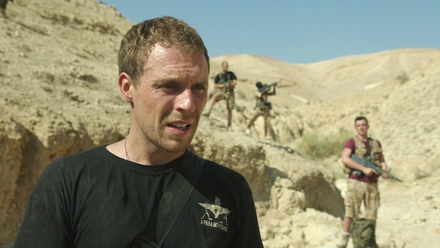
What, would you say, was the thing that caused you the most problems in bringing the story to the screen?
Money. Our crowd funding raised an initial £47,000, which was fantastic but only a fraction of what was needed. The rest came from shareholders and eventually some industry money. But the broadcasters and BFI [British Film Institute] all turned us down.
The film is brilliantly cast, and the emotional attachment you form with the people on screen is immediate. Did the actors spend much time with the survivors and their families before filming commenced?
Not a huge amount. It all happened very quickly between casting and shooting. Everyone had access to the transcripts of our original interviews and most at least spoke to their counterparts before going, but I did insist that this was not to be about impersonation. We did a read-through and then spent a couple of days on a bootcamp with some ex-Paras. That was invaluable in giving everyone a taste of army life - the banter, the rations, the kit, as well as bonding as a group. We were also all read the riot act regarding making sure we got it right. Everyone felt quite inspired by that. After that, we went out for the evening and some of the original guys managed to come along. It was a great evening and those who met their namesakes took a lot out of it.
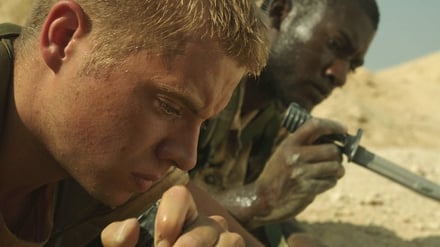
Was it very sombre on set?
No. But it was extremely focussed. We were working in 50-degree plus heat and it was pretty gritty for everyone. But because we were all in the same boat there was very high morale throughout. Plenty of humour - but when the camera turned there was a complete focus from everyone. From my perspective it was a joy to work with such a fantastic cast and crew. I hope I get the chance to repeat the experience.
Did the soldiers credit their gallows humour with getting them through the situation?
Good question. I haven't asked. But I would have thought so. Undeniably, staying awake and hanging on in those circumstances required something a bit special and laughing in the face of adversity can't but help.
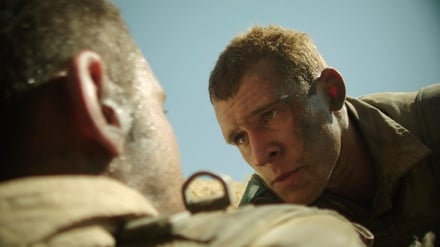
It's a very tough, and moving, watch - did you become upset while making it or did the emotional release only come for you afterwards?
You've got to remember that filmmaking is a pretty technical process, but everyone on set knew when we'd watched a particularly special performance. We burst into applause on many occasions. Just once was I unable to hold back the tears - during Prosser's birthday speech. But I'm sure that was just because I was very tired and nothing to do with John's [Doughty] performance!
What has surprised you most about audience members' responses to the film?
Well, it all really. Brin [editor] and I knew we had something pretty good but I don't think either of us quite expected the impact the film has on people. I remember a very early screening when I saw the audience was completely silent, throughout the credits and as they walked out. 'Oh God,' I thought, 'they think it's rubbish'. Subsequently, I have learnt that this is just the way the film impacts on people. It just shows how powerful film can be in sharing an experience so totally with an audience.
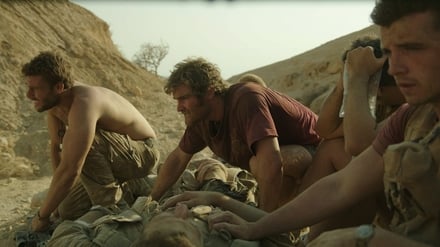
In terms of being a member of the audience, I learned so much about humility watching this film. What was the biggest lesson Kajaki taught you?
Good question. I think perseverance, and never, ever giving up. That goes for me as a filmmaker as well.
What can you tell us about how the soldiers from Kajaki are getting on in 2015?
Well I won't list what everyone is up to in detail but will say that they are all appearing to be getting on well with life. Those that are now civilians seem to be settled with good jobs etc. I have little doubt that some still carry demons with them but if they do, they have either learned to cope or conceal them well. They are all also, in my opinion, top blokes and any one of whom I'd be proud to call a friend.
Has the film changed your perception of the conflict, or conflict in general, in any way?
You know, I'm not sure it has. I've always believed in cock-up over conspiracy. And also that heroes don't appear from the womb fully formed. They are forged in exceptional circumstances from ordinary people. Whatever you think of this particular conflict, conflict in general appears to be an inevitable part of human existence and given that, you need men who are willing to undertake it on behalf of the society to which they belong. And if you are going to ask men to do that, to take lives and put their own on the line, then you need to fully understand what you have done and the consequences that might flow from that. I'm not sure we have faced up too well to that in the UK, and I hope Kajaki is one small step in addressing it.
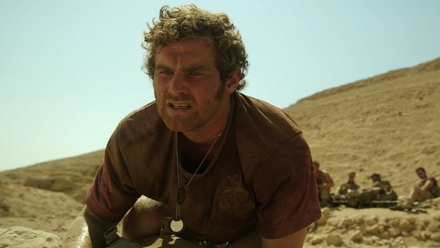
There's a Samuel Johnson quote that goes, 'Every man thinks meanly of himself for not having been a soldier'. Do you think that's accurate?
No. But I know where he's coming from. I suspect, it's a combination of a kind of guilt not to have been part of it with a natural desire to have been tested and to have been proven. There are other ways to prove that today, I think.
What are you planning to make next?
I have a couple of ideas we are starting to work on. I did promise myself that the next film would have women in it!

